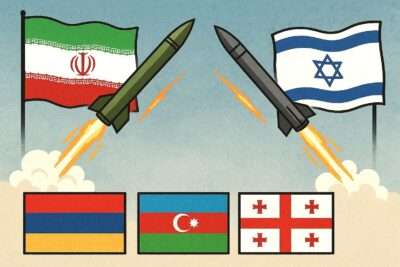
Against the backdrop of the Iran-Israel conflict, the Ankara–Baku axis may be emboldened to militarily assert control over up to 60% of Armenian territory, says Special Eurasia
The Ankara–Baku axis may be emboldened to militarily assert control over up to 60% of Armenian territory that Azerbaijan designates as “Western Azerbaijan.” Azerbaijan’s alleged support for recent Israeli strikes on Iran risks triggering direct retaliation from Tehran, undermining regional stability, Special Eurasia writes.
As noted, Baku may now seek to capitalize on Tehran’s entanglement in a potential conflict with Tel Aviv to forcefully secure the “Zangezur Corridor”, reshaping regional transit routes to its advantage.
European powers, prioritizing energy security over international law, have largely refrained from condemning Israel’s actions in Gaza and Azerbaijan’s offensive in Nagorno-Karabakh, thereby contributing to destabilization.
The website states that Tehran has long been one of Yerevan’s principal allies, consistently resisting any territorial adjustments to Armenia’s sovereign borders, particularly in response to Azerbaijan’s claims regarding the so‑called “Zangezur Corridor.”
Iranian officials emphasized that the corridor was not merely a transportation project but rather a strategic geopolitical undertaking.
Recent Israeli airstrikes in Iran’s East Azerbaijan province triggered speculation regarding Azerbaijan’s possible involvement in supporting the offensive. Furthermore, unconfirmed sources reported drones approaching Bandar-e Anzali coming from Azerbaijan’s maritime border in the Caspian Sea.
A Haaretz investigation detailed Israel’s substantial role in enabling the ethnic cleansing of Armenians in Artsakh. Based on flight‑tracking data and Associated Press reports, Israeli cargo planes transported weapons to Azerbaijan immediately prior to the September 2023 offensive, directly reinforcing Azerbaijan’s military operations.
From 2016 to 2020, Israel supplied approximately 69% of Baku’s major arms imports, including IAI Harop loitering munitions, cluster munitions, and Barak‑8 air-defense systems. These weapons, including drones, missiles, and defense systems, underpinned a rapid military campaign that forced Armenians from their homes.
With no substantial condemnation from major European powers, Germany even signed a new energy deal with Baku.
Against this backdrop and with Iran entangled in hostilities with Israel and indirectly with its Western allies, the Ankara–Baku axis may be emboldened to militarily assert control over up to 60% of Armenian territory that Azerbaijan designates as “Western Azerbaijan.”
Azerbaijan’s potential involvement in the recent Israeli strikes against Iran would carry significant reverberations. First, it would significantly undermine Baku’s strategic soft-power efforts to encourage separatism among Iran’s Azerbaijani population, notably in Tabriz, a city targeted in the recent strikes. Second, it could prompt Iran to revisit its investigation into the May 19, 2024, helicopter crash that claimed the lives of President Raisi and Foreign Minister Amir Abdollahian near Uzi in East Azerbaijan province following an official visit to Azerbaijan.
Europe’s involvement in both the Gaza crisis and the Nagorno-Karabakh conflict has drawn increasing scrutiny. Following the erosion of its partnership with Georgia, Brussels has sought to reposition Armenia as a strategic regional ally in the Caucasus. Nevertheless, Europe’s unwillingness to hold Baku accountable for the blockade and ethnic cleansing in Nagorno-Karabakh/Artsakh underscores that energy security continues to outweigh human rights and international law in its foreign policy priorities.
The intersection of energy interests, regional rivalries, and shifting alliances is driving a dangerous escalation across the South Caucasus and Middle East. The alignment of Israel, Azerbaijan, and key Western powers risks undermining international law and further marginalizing actors like Iran and Armenia.
With Tehran deeply engaged in its conflict with Tel Aviv, and Washington distracted by managing the wider regional tensions, Yerevan faces an increased risk of a military offensive from Baku, which could exploit this strategic distraction to pursue its territorial goals.
Although not officially acknowledged, the removal of Palestinians from Gaza and the establishment of the so-called “Zangezur Corridor” would represent strategic gains for Europe. These developments align with its aim to position Israel as a key energy distribution hub and would finally allow a direct connection to the energy-rich Central Asian republics via Turkey and Azerbaijan.
Without a recalibration of strategic priorities, the current trajectory may entrench conflict and destabilize critical transit corridors vital to global energy and security frameworks.


